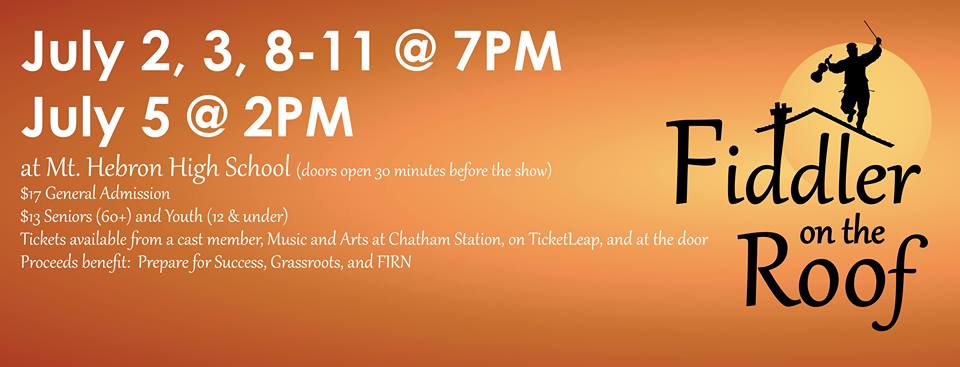Anatevka; where else would the Sabbath be so sweet? Why at the Howard County Summer Theatre, of course, where the Sabbath and several days surrounding it are simply resplendent as they mount their 41st season’s production: Fiddler on the Roof. Directed by Tom Sankey with Musical Direction by Christopher Hattenbach and Kevin George, this resilient classic proves to their finest production yet with a talented cast, rustic sets, and authentic costumes. The show is a delight for families all over Howard County this summer season.
When a show’s title calls for a specific instance of scenery, it becomes crucial that said element be incorporated into the show’s scenic design. Set Designer Pete Johnson crafts a sturdy yet weathered looking roof upon which the fiddler perches for the opening scene. The more impressive note about Johnson’s set work is not the roof, but the entire pull-apart house that sits under it. With swinging doors, the house opens much like an old-fashioned dollhouse to reveal a furnished and decorative interior that suits the show’s setting with antiquated charm.
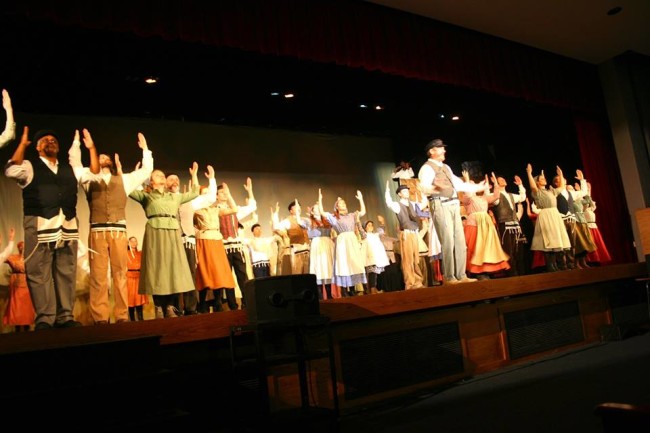
Costume Director Laural Seivold Clark ensconces the almost 70-person cast in the look of 1905 impoverished Jewish Russia. The colors feature muted earth tones, reflecting the humble lives of the villagers of Anatevka. The patterns are simple, the outfits repetitive, solidifying the notion of community and tradition among the large ensemble. Little notes of detail in Clark’s work include the revolutionary red vest strapped to Perchik, the rebel outsider, and the flashy jewel turquoise tones used on Fyedka, a reflection of the Christian-wealth influence outside the Jewish faith.
Both Vocal Director Christopher Hattenbach and Orchestra Director Kevin George create striking sounds throughout the performance that deliver this show to a humble but beauteous success. George conducts the orchestra with finesse; rich, bold, and smooth sounds delivering the iconic music to the ears of the audience. Tempering the swells and crescendos into blended bursts of sound, George ensures that the live orchestra never overpowers or overplays the cast. Hattenbach understands the importance of blending volumes as well and showcases his ability to draw power and emotion from the ensemble without having them blast the songs they are singing. Perfect examples of these harmonious moments include “Sabbath Prayer” and “Anatevka.” Both numbers feature the delicate balance of singers gliding into the refrains, imbued with somber yet proud undertones and strong emotional connections to the songs’ feelings.
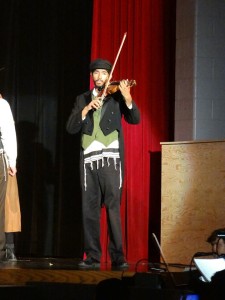
Additional praise should be showered over Nithin Venkatraman, the show’s title character. A real live fiddler, who does indeed find himself up on the rooftop of the show’s little house, Venkatraman plays to perfection the show’s iconic opening and fiddles throughout the performance with gracious bow movements and a stoic but kind persona that is reflected in his posture and his eyes. What a difference a live fiddler actually playing a fiddle can make for such a show!
Director Tom Sankey utilizes his large cast and even larger space to the show’s advantage. For “Sabbath Prayer” the ensemble slips quietly into the house, grouping in small clusters around candles to show that the village extends beyond family on stage. There is never a sense of overcrowding because of Sankey’s sharp approach to blocking, and “The Rumor” has the epitome of flow for its replication of a game of telephone gone wrong. Sankey’s most ingenious creation in the performance is not his blocking or understanding of size, but his execution of “The Dream.” Populated with the ensemble in their burial shrouds and shuffling about like zombies, Sankey imports the otherworldly feel that the number describes. His shining glory is Fruma-Sarah (Katie Rasmussen) as she drifts in; larger than life and moving by unearthly means unseen, Sankey puts the theatrical spectacle of Broadway into this number.
While Fiddler is the not the dance-heavy musical of the modern day stage, it is not without its moments and opportunities for fine routines. Choreographer Amanda Tschirgi keeps with tradition and finds dances that fit the music as well as the Jewish cultural aesthetic of the show. “Tradition” is filled with unified individual gestures for each group, the poppas, the mommas, and so forth, while “To Life” has a much more celebratory undertone in the spinning and twirling. Tschirgi even gives Fyedka and the Russian boys a chance to showcase their acrobatic ballet moves in this number, which livens up the scene tremendously. The crowd favorite? The sliding knees and fancy footwork of the bottle dancers featured during the wedding scene.
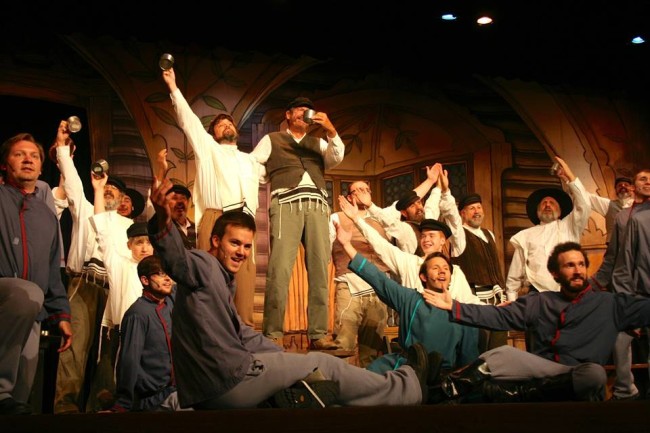
Standout performances happen across the board and with a cast of nearly 70 it would be impossible to mention them all. The authoritative Constable (Chuck Bagley) has a softer but deliberate side to his menace in the village of Anatevka. Mordcha (Ed Bishop) the innkeeper makes a lovely comic presence both the scene leading into “To Life” and during his speech at the wedding while The Rabbi (Doug Kook) has a gorgeous voice that is afforded but one solo, which isn’t even an official song but a sung prayer over Motel’s new sewing machine. Mendel (Tharen Rice) the Rabbi’s son, is also of praiseworthy note. Rice delivers a flagrant presence as the defiant youth who stands up for tradition. It is an impressive juxtaposition to view his attitude against that of the rebellious and revolutionary Perchik (Justin Moe.)
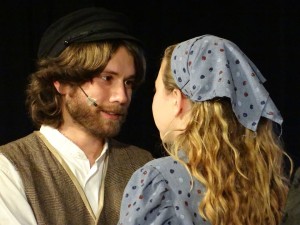
Moe, who wears the colors of revolution on his chest, is indeed an upstart blast of changing energy that shakes up the settled dust of Anatevka upon his arrival. There is a sharpness in his stance as well as his line delivery, and his pointed and cheeky banter with Hodel (at this performance Christina Mattera) reverberates with spirited enthusiasm. His only solo, “Now I Have Everything” asserts a warm and inviting voice, and his impressive sustain for the end of the number swells his voice with pride and happiness. Mattera joins him for this number and provides a lovely harmony, complimenting his voice with grace and ease.
Mattera’s solo “Far From the Home I Love” is both mournful and heartfelt as she bids a teary-eyed goodbye to her poppa at the train station. Mattera’s lovely voice can also be heard as a part of the trio early in the production during “Matchmaker” where she offers a strong and solid sound against Chava (Kassi Mattera) and Tzeitel (Stephanie Ichniowski.) Though Kassi Mattera is not given a solo of her own, she carries a great deal of emotional turmoil in her portrayal. Standing on the opposite side of the stage as Fyedka (Nathan Moe) at the close of Act I, the pair craft a gloriously symbolic moment of heartache and destruction with Ichniowski knelt between them. Kassi Mattera delivers a gut-wrenching plea to her poppa which easily draws a tear to the eye.
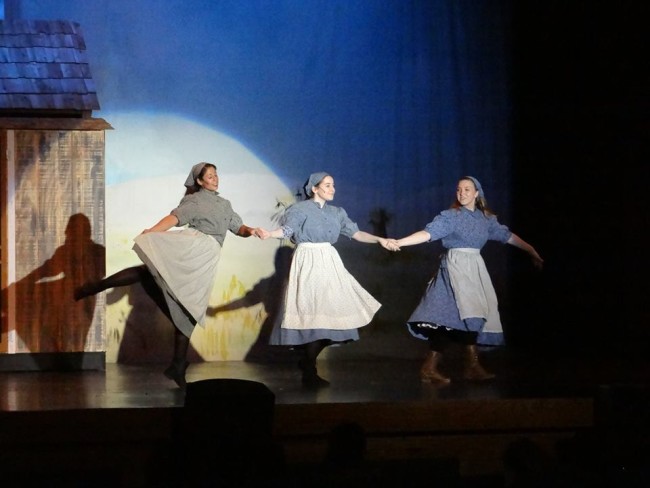
Ichniowski has a warming and fulfilling voice which layers with resplendence over her two sisters during “Matchmaker.” Her mockery of Yente (at this performance Robbie Babbitt) is a moment of earnest comic delight. This entire number is rounded out to perfection with the introduction of the remaining two sisters, Shprintze (Madi Heinemann) and Bielke (Maggie Williams) with all five daughters singing and smiling through the closing of it. Ichniowski holds her own during the wedding scene, always a smile on her face, and she provides genuine reactions during moments shared with her true heart’s intended.
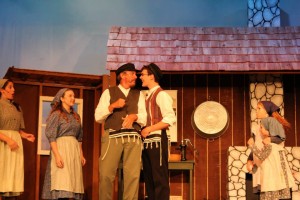
Miracle of miracles is David Fisher playing the timid Motel the tailor. With a nervous disposition that translates into comic genius, Fisher cowers at Tevye and crashes into him for some hilarious moments throughout the first act of the show. But his over-zealous jittery persona cannot hide the insanely talented voice that lays within him. “Miracle of Miracles” is a sparkling number filled to the brim with energetic exuberance that truly reflects Motel’s excitement to have triumphed in the name of love.
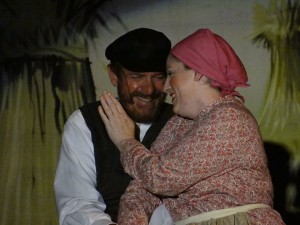
The question of love has never previously been a factor, at least not for Golde (Robyn Bloom) and Tevye (Mo Dutterer.) Dutterer’s robust voice and Bloom’s versatile personality are the perfect match for these two roles, right? Of course right! Bloom carries the emotional sentimentality of duets like “Do You Love Me?” and their verses in “Sunrise Sunset” while Dutterer fills in the lyrical essences. The banter and snappish repartee between the couple is true to form when it comes to Golde and Tevye and translates to perfection, particularly with the little asides and one-liners during spoken exchanges. Dutterer pumps the character full of giddy humors for “To Life” a duet shared with Lazar Wolf (Todd Hochkeppel) and the men of the tavern, and delivers an amusing rendition of “If I Were a Rich Man” his unique comic timing finding some previously undiscovered undertones of humor in that well-loved song.
Truly a tradition with their large, multi-generational casts, Howard County Summer Theatre has a production well worth praising with Fiddler on the Roof.
Running Time: Approximately 2 hours and 50 minutes with one intermission
Fiddler on the Roof plays through July 11, 2015 at the Howard County Summer Theatre in the auditorium of the Mt. Hebron High School— 9440 Old Frederick Road in Ellicott City, MD. Tickets may be purchased at the door or in advance online.

